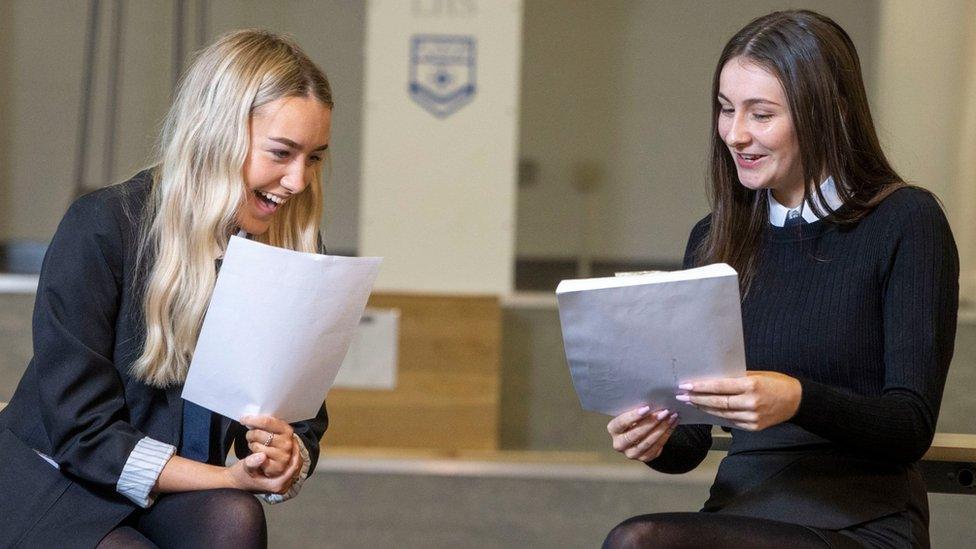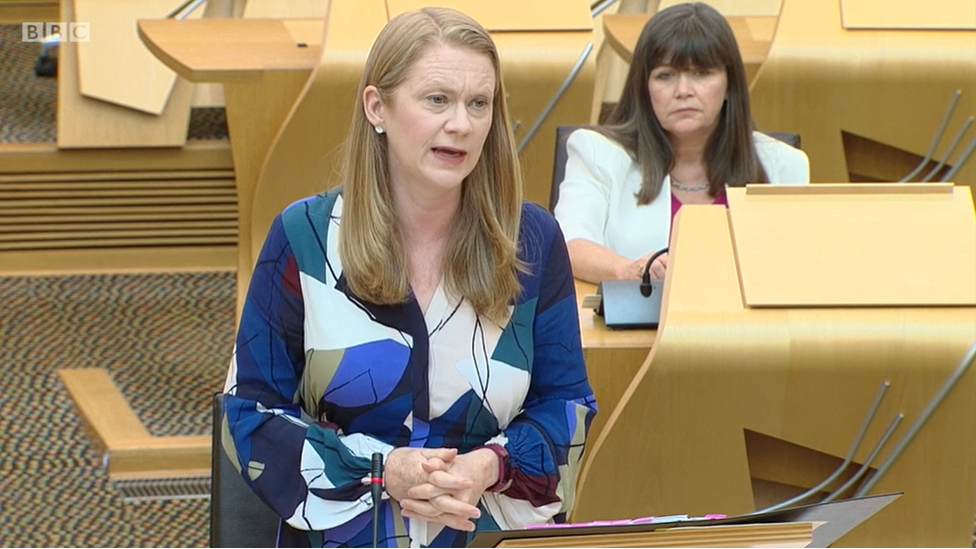School appeals 'can revise grades down as well as up'
- Published

Qualification results have been based on teacher judgement rather than traditional exams due to the Covid-19 pandemic
Scottish school pupils will have the right to appeal their assessment grades - but could see them revised up or down, the education secretary has said.
Shirley-Anne Somerville told MSPs that there would be a "direct right of appeal" for pupils when Higher and National 5 results come out in August.
But she said a "fair, consistent and credible" system would have to be able to revise grades down as well as up.
Opposition parties said this made appeals a "perverse gamble" for pupils.
Grades are to be based on teacher judgements - without the use of any algorithms or the past performance of schools - after exams were cancelled for the second year running due to the Covid-19 pandemic.
Ms Somerville - who recently replaced John Swinney as education secretary - told MSPs that ensuring young people are able to achieve "fair and credible grades" despite the ongoing pandemic was the government's "absolute priority".
She said she took "very seriously" the anxiety and concern of some young people, parents and teachers about the model being used, but insisted it was "the fairest possible" in a challenging set of circumstances.
National 5, Higher and Advanced Higher exams have all been cancelled, with grades to be based on the "professional judgements" of teachers and what learners have demonstrated during the school year.
However due to the second national lockdown from the start of the year, much of the assessment work done by teachers has come in the final weeks of term - leading to claims these are "exams by another name".
Ms Somerville said parents and pupils have been listened to, adding: "Awarding qualifications will always be challenging under these circumstances, but we believe that the model we have is the fairest solution in the interests of young people."
And she said there would be a "direct right of appeal" for all pupils for the first time, which would be free at the point of use.

Shirley-Anne Somerville was recently appointed education secretary
Grounds for appeal will include disagreement with the "academic judgement" behind grades, administrative or procedural errors or appeals related to the Equality Act, including assessment arrangements.
Appeals will be assessed by subject specialists, but Ms Somerville said the system must be "symmetrical" - meaning they can move grades up, down or leave them unchanged.
She said: "Without symmetry, there would not be a full and fair review of the evidence. This could be perceived as unfair to other learners and raise questions over the credibility of qualifications awarded this year.
"In adopting a symmetrical approach to appeals, judgements at appeal will be made on individual learners' work only and not on an algorithm or on a school's past performance."
'Exceptionally rare'
Opposition parties were critical of the plans, with Green MSP Ross Greer arguing for a "no detriment" approach to appeals where grade could not be revised down.
He said lacking such a system made appeals a "perverse gamble", adding: "Schools will support the strongest evidence they have in support of the initial grade - why would they have stronger evidence suitable for an appeal which they chose not to submit in the first place?
"It seems the risk of downgrading is increased by an appeals process reliant purely on limited and likely weaker evidence, rather than on the professional judgement of teachers."
Ms Somerville replied that it was "exceptionally rare" for pupils to have grades reduced on appeal, saying this happened in eight cases out of 13,000 in 2017 and one among 11,000 in 2019.
The Children and Young People's Commissioner, Bruce Adamson, said it was disappointing that grades could be marked down on appeal, saying this was "an unnecessary and disempowering barrier to young people" and could exacerbate anxiety for pupils.
Liam Fowley, vice chairman of the Scottish Youth Parliament, said the appeals process is "simply not acceptable" and fails to take into account the "exceptional circumstances" faced by young people during the pandemic.
The Educational Institute of Scotland (EIS) teaching union meanwhile welcomed much of the statement, saying staff were doing "a quite phenomenal amount of work" to deliver grades amid the pandemic.
However the NASUWT union - which opposed the current certification model - raised concerns that teachers might have to be available during the summer holidays to engage with the appeals process, despite already facing "overwhelming and unacceptable levels of workload and anxiety".

Appeals are always part of the exams system in Scotland but arguably the role they play this year is much more important.
Normally appeals are made through schools and for a limited number of reasons, usually a pupil has to have been given a worse grade in the final exam than their teacher predicted.
Allowing pupils to appeal directly to the SQA and for a wider range of reasons will be welcomed by young people.
What will not be as welcome is the fact that grades can be revised down as well as up.
This is normal practice, but many argue that this year that option should be off the table to account for the disruption young people have faced and that this could be seen as downgrading teacher judgement.

Meanwhile, BBC Radio Scotland's Lunchtime Live programme has found that more than 6,500 pupils have been using a website set up to cheat in this year's assessments.
It comes after it was revealed last month that details of assessments were being shared by pupils on TikTok.
Each school has its own arrangements and set its own assessments, but the Scottish Qualifications Authority (SQA) has provided question papers which they can use - and many have been shared on an "anti SQA" site online.
In some cases, these papers - at Advanced Higher, Higher and National 5 - are being shared in their entirety, along with answers.
Scottish Conservative education spokesman Oliver Mundell said assessment papers were available online "on an industrial scale".
"Nobody condones attempts to cheat, but SNP ministers were too busy trying to paint a rosy picture instead of tackling the reality for pupils," he said.
A Scottish government spokesman said the SQA had taken action to contact schools "to ensure that posts were removed as soon as possible and to reiterate the importance of security arrangements around assessment materials".
Labour education spokesman Michael Marra said he had been contacted be "very many" angry parents, saying the publication of the appeal process was "well over a month late" and came 20 days before teachers have to submit grades.
And he said there had been reports of "widespread variation" in the way pupils have been assessed, with complaints that some had faced multiple assessments in a short period of time.
Lib Dem MSP Beatrice Wishart said a constituent had told her the current system was the worst model possible, saying it had "increased stress levels" for pupils and that there were "no excuses left" for the SQA.